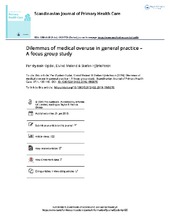Dilemmas of medical overuse in general practice - A focus group study
Peer reviewed, Journal article
Published version

Åpne
Permanent lenke
https://hdl.handle.net/1956/23393Utgivelsesdato
2019Metadata
Vis full innførselSamlinger
Originalversjon
https://doi.org/10.1080/02813432.2019.1569370Sammendrag
Objective: To obtain first-hand in-depth accounts of overtesting amongst GPs in Norway, as well as the GPs’ perspectives on drivers of overtesting and strategies that can prevent overtesting. Design and setting: Four focus groups with GPs were conducted. All participants were asked to share examples of unnecessary testing from their everyday general practice, to identify the driving forces involved in these examples and discuss any measures that might prevent excessive testing. All authors collaborated on the analysis, conducted as systematic text condensation, using critical incident technique. Results: This study reveals two main positions regarding overtesting in general practice. In the categorical position there is no such thing as overtesting and GPs are obliged to perform extensive investigations on the suspicion that any person can carry a fatal disease, no matter how minor or absent their symptoms are. In contrast, in the dilemmatic position, the GPs acknowledge that investigations can cause significant harm, but still feel pressured to discover disease at the earliest opportunity and to meet patients’ demands. The GPs’ strategies for resolving this dilemma are often demanding and not always successful, but sharing uncertainty and fallibility with patients and colleagues appears to be the most promising strategy. Conclusions: Our study indicates that GPs in Norway experience a strong pressure to discover any instance of disease and to meet patients’ demands for investigations. One way of preventing the harm that accrues from overtesting is openly sharing uncertainty and fallibility with patients and colleagues.
